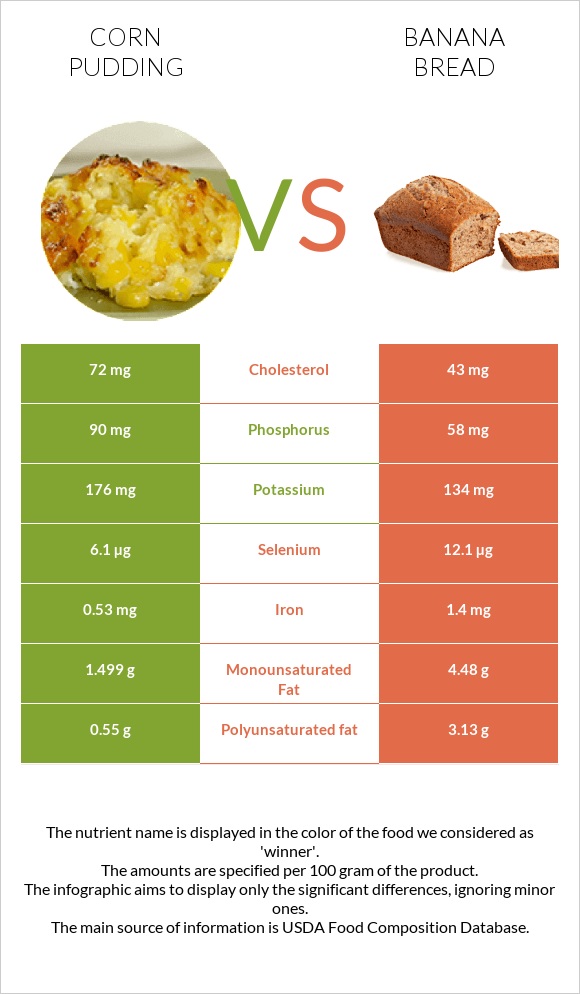Corn pudding vs. Banana bread — In-Depth Nutrition Comparison
Compare
A recap on the differences between corn pudding and banana bread
- Corn pudding is higher in vitamin B12, yet banana bread is higher in selenium, iron, vitamin B1, manganese, monounsaturated fat, and polyunsaturated fat.
- Banana bread covers your daily selenium needs 11% more than corn pudding.
- Corn pudding contains 3 times more vitamin B12 than banana bread. While corn pudding contains 0.31µg of vitamin B12, banana bread contains only 0.1µg.
- The amount of cholesterol in banana bread is lower.
Food varieties used in this article are Corn pudding, home prepared and Bread, banana, prepared from recipe, made with margarine.
Infographic

Infographic link
Mineral Comparison
Mineral comparison score is based on the number of minerals by which one or the other food is richer. The "coverage" charts below show how much of the daily needs can be covered by 300 grams of the food.
| Contains more CalciumCalcium | +85.7% |
| Contains more PotassiumPotassium | +31.3% |
| Contains more ZincZinc | +37.1% |
| Contains more PhosphorusPhosphorus | +55.2% |
| Contains more IronIron | +164.2% |
| Contains more CopperCopper | +67.4% |
| Contains more ManganeseManganese | +164.6% |
| Contains more SeleniumSelenium | +98.4% |
Vitamin Comparison
Vitamin comparison score is based on the number of vitamins by which one or the other food is richer. The "coverage" charts below show how much of the daily needs can be covered by 300 grams of the food.
| Contains more Vitamin CVitamin C | +117.6% |
| Contains more Vitamin EVitamin E | +∞% |
| Contains more Vitamin DVitamin D | +∞% |
| Contains more Vitamin B12Vitamin B12 | +210% |
| Contains more Vitamin KVitamin K | +∞% |
| Contains more Vitamin AVitamin A | +86% |
| Contains more Vitamin B1Vitamin B1 | +149.3% |
| Contains more Vitamin B2Vitamin B2 | +29.9% |
| Contains more Vitamin B3Vitamin B3 | +40% |
| Contains more Vitamin B6Vitamin B6 | +18.1% |
| Contains more FolateFolate | +13.8% |
All nutrients comparison - raw data values
| Nutrient |  |
 |
DV% diff. |
| Polyunsaturated fat | 0.55g | 3.13g | 17% |
| Carbs | 16.97g | 54.6g | 13% |
| Iron | 0.53mg | 1.4mg | 11% |
| Selenium | 6.1µg | 12.1µg | 11% |
| Calories | 131kcal | 326kcal | 10% |
| Cholesterol | 72mg | 43mg | 10% |
| Choline | 55.5mg | 10% | |
| Vitamin B1 | 0.069mg | 0.172mg | 9% |
| Vitamin B12 | 0.31µg | 0.1µg | 9% |
| Fats | 5.04g | 10.5g | 8% |
| Monounsaturated fat | 1.499g | 4.48g | 7% |
| Manganese | 0.079mg | 0.209mg | 6% |
| Phosphorus | 90mg | 58mg | 5% |
| Vitamin A | 57µg | 106µg | 5% |
| Vitamin B5 | 0.268mg | 5% | |
| Starch | 8.68g | 4% | |
| Vitamin B2 | 0.154mg | 0.2mg | 4% |
| Vitamin D | 22 IU | 3% | |
| Copper | 0.043mg | 0.072mg | 3% |
| Vitamin D | 0.5µg | 3% | |
| Vitamin B3 | 1.033mg | 1.446mg | 3% |
| Vitamin C | 3.7mg | 1.7mg | 2% |
| Calcium | 39mg | 21mg | 2% |
| Vitamin E | 0.27mg | 2% | |
| Vitamin B6 | 0.127mg | 0.15mg | 2% |
| Potassium | 176mg | 134mg | 1% |
| Zinc | 0.48mg | 0.35mg | 1% |
| Sodium | 282mg | 302mg | 1% |
| Folate | 29µg | 33µg | 1% |
| Saturated fat | 2.451g | 2.237g | 1% |
| Protein | 4.42g | 4.3g | 0% |
| Net carbs | 15.77g | 53.5g | N/A |
| Magnesium | 15mg | 14mg | 0% |
| Sugar | 6.59g | N/A | |
| Fiber | 1.2g | 1.1g | 0% |
| Vitamin K | 0.5µg | 0% | |
| Trans fat | 0.093g | N/A | |
| Tryptophan | 0.059mg | 0.053mg | 0% |
| Threonine | 0.169mg | 0.15mg | 0% |
| Isoleucine | 0.195mg | 0.182mg | 0% |
| Leucine | 0.438mg | 0.327mg | 0% |
| Lysine | 0.33mg | 0.18mg | 0% |
| Methionine | 0.114mg | 0.094mg | 0% |
| Phenylalanine | 0.216mg | 0.218mg | 0% |
| Valine | 0.255mg | 0.209mg | 0% |
| Histidine | 0.11mg | 0.113mg | 0% |
| Omega-3 - EPA | 0.001g | 0g | N/A |
| Omega-3 - DHA | 0.006g | 0.004g | N/A |
Macronutrient Comparison
Macronutrient breakdown side-by-side comparison
Protein:
4.42 g
Fats:
5.04 g
Carbs:
16.97 g
Water:
72.33 g
Other:
1.24 g
Protein:
4.3 g
Fats:
10.5 g
Carbs:
54.6 g
Water:
29.2 g
Other:
1.4 g
| Contains more WaterWater | +147.7% |
| Contains more FatsFats | +108.3% |
| Contains more CarbsCarbs | +221.7% |
| Contains more OtherOther | +12.9% |
~equal in
Protein
~4.3g
Fat Type Comparison
Fat type breakdown side-by-side comparison
Saturated fat:
Sat. Fat
2.451 g
Monounsaturated fat:
Mono. Fat
1.499 g
Polyunsaturated fat:
Poly. Fat
0.55 g
Saturated fat:
Sat. Fat
2.237 g
Monounsaturated fat:
Mono. Fat
4.48 g
Polyunsaturated fat:
Poly. Fat
3.13 g
| Contains more Mono. FatMonounsaturated fat | +198.9% |
| Contains more Poly. FatPolyunsaturated fat | +469.1% |
~equal in
Saturated fat
~2.237g




